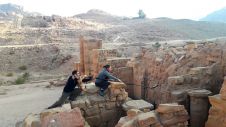Land Information Policies in the Americas
Special Forum Held at Aguascalientes, Mexico, 26-27 October 2004
This Special Forum on the Development of Land Information Policies for the Americas was based on a resolution adopted at the Seventh United Nations Regional Cartographic Conference for the Americas held New York in January 2001. The International Federation of Surveyors was tasked with taking the lead role in organising the event, with support from the United Nations Statistics Division, the Department of Economic and Social Affairs, and the Permanent Committee on Spatial Data Infrastructures for the Americas (PC IDEA). The National Institute of Statistics, Geography and Informatics (INEGI) in Aguascalientes, Mexico hosted the forum. The UN had issued invitations to government ministers with responsibility for the above functions or their senior policy managers. There were about sixty delegates from eighteen countries, together with representatives from the UN, PC IDEA, the World Bank and the Pan American Institute of Geography and History (PAIGH). A final report of forum proceedings will be tabled at the Eighth United Nations Regional Cartographic Conference for the Americas to be held in June 2005 in New York; entitled Aguascalientes Statement, the report may now be found at the FIG website.
Land Management
Land Management is a very complex and interdisciplinary concept that includes a mix of technical, natural, and social sciences. It can be described as the processes by which land resources are used to good effect. It is about land policies, land rights, property economics, land-use control, regulation, implementation and development. Land management encompasses all activities associated with the management of land as an asset and a resource to achieve sustainable development. The land information area should be organised so as to combine cadastral and topographic data, thereby linking the built environment (including legal land rights) with the natural environment (including environmental and natural resource issues). Land information should be organised as a spatial data infrastructure at national, regional and local level, based on relevant policies for data sharing, cost recovery, access to data, standards, etc.
Sound land management comprises the operational processes of implementing land policies in a comprehensive and sustainable way. In many countries, however, there is a tendency to separate land-tenure rights from land-use rights. There is no effective institutional mechanism for linking planning and land-use controls with land values and the operation of the land market. Poor administrative and management procedures that fail to deliver the services needed often compound existing problems. Investment in new technology goes only a small way towards solving a much deeper problem: the failure to treat land and its resources as a coherent whole.
Having few university programmes in Land Management, the Latin American and Caribbean region sorely lacks experts to support systems for sustainable land administration infrastructure. Comprehensive university programmes need to be developed with a broader profile than a purely technical focus. And there is need to share efforts and information between educational institutions in order to serve the basic land-administration needs of the region. Donors such as the World Bank and other aid agencies, where they are building land-administration systems should include the educational component to ensure long-term sustainability.
Findings and Recommendations
- It is important that countries in the region develop a wider vision for the creation of knowledge, reduction of poverty and sustainability.
- The need to formulate national policies, legal frameworks and standards for land administration, land information and spatial data infrastructure is widely acknowledged.
- Given the large number of priorities they face, it is important to demonstrate to high-level decision-makers the economic value of land administration systems and SDIs. Visionary leadership and short-term initiatives, such as shared data collection projects, are recognised as important for the establishment of inter-organisational and inter-regional co-operation.
- It is important to have a focus on users’ needs in order to build trust amongst beneficiaries of systems. Credibility and transparency must be built into the processes, including institutional continuity and continuous modernisation.
- The need for human resources capacity development through the building of educational and training programmes in Land Administration must be reinforced.
- There is a need to integrate land administration, cadastre and land registration functions with topographic mapping programmes within the context of a wider
national strategy for spatial data infrastructures.
Acknowledgements
Support and funding by the Canadian Government through Natural Resources Canada, the US Government through USGS/FGDC and USAID, the World Bank through the Danish Trust Fund, and PAIGH, are gratefully acknowledged.
www.fig.net/pub/figpub/pubindex.htm

Value staying current with geomatics?
Stay on the map with our expertly curated newsletters.
We provide educational insights, industry updates, and inspiring stories to help you learn, grow, and reach your full potential in your field. Don't miss out - subscribe today and ensure you're always informed, educated, and inspired.
Choose your newsletter(s)
























